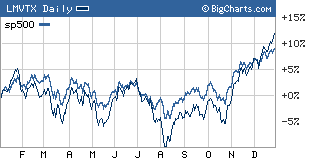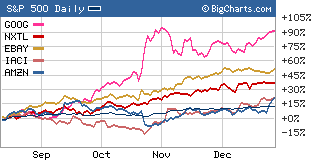This story originally ran on Dec. 1 and has been updated.
 |
|
| Bill Miller's Legg Mason Value Fund is ahead for 2004. |
NEW YORK (CNN/Money) -- Will Bill Miller keep his streak alive?
The manager of the Legg Mason Value Trust fund is famous on Wall Street for having outperformed the S&P 500 index for the past 13 years. That's the mutual fund world's equivalent of Joe DiMaggio's 56-game hitting streak.
And with three trading days left in 2004, Miller is on the verge of extending the streak. Through Dec. 28, Miller's fund was up about 12 percent, while the S&P 500's year-to-date gain is 9.1 percent. (Miller's lead isn't as big if you factor in dividends -- the S&P 500, is up nearly 11 percent on a total return basis.)
It's a remarkable comeback for Miller, who had been trailing the S&P 500 for most of the year.
The fund's performance had been held in check in part because of big bets on Amazon.com (Research) and IAC/InterActive (Research), two Internet stocks that through the end of November had each fallen about 25 percent. As of Sept. 30, these two stocks accounted for almost 11 percent of the fund's total assets.
But December has been kind to both stocks. Each has gained nearly 12 percent this month. Amazon shot up thanks to reports of strong online sales during the holidays and IAC/InterActive took off after the company announced last week that it would be forming a separate company for its portfolio of online travel assets.
Miller was not available for comment. But in his most recent letter to shareholders, published in November, he wrote that the decision to not cut back on some of the fund's biggest winners from 2003, including Amazon and IAC/Interactive, was a main reason why the fund had underperformed for the first 11 months of the year.
He also wrote that he regretted not buying energy stocks, which have soared this year due to near-record oil prices.
Foolish to underestimate momentum
Still, even though some were counting out Miller at the beginning of the month, it seemed evident back then that there was a decent chance that he could wind up going on to beat the S&P 500 again.
 |
|
| Lucky 14? Bill Miller's Legg Mason Value Trust has pulled ahead of the S&P 500 in the final few days of the year. |
Miller had momentum on his side. Tech stocks have taken off in the past few months and this has helped.
The fund may have the name value in the title, but it is actually far more growth oriented than other value funds. Miller invested in search engine Google (Research), for example, which has been a huge winner since its IPO, up more than 125 percent.
"Miller has an expansive view of value, to say the least," said Sheldon Jacobs, editor of the No-Load Fund newsletter.
Wireless carrier Nextel (Research), Miller's largest holding has been on a tear during the past few months and it didn't hurt Miller that the company agreed to be taken over by Sprint (Research) earlier this month. Nextel has surged 40 percent since the market hit its low point for the year in mid-August.
And eBay (Research), another large position, has gained 50 percent since mid-August.
 |
|
| Bets on high profile tech stocks have helped Miller since the market bottomed in mid-August. |
But Miller has also done well lately with some more traditional value stocks. Insurer UnitedHealth (Research), Eastman Kodak (Research) and electric utility AES (Research) -- all top 10 holdings -- have outperformed the market during the past four months as well.
So it's not surprising that since the market bottomed, Miller's fund is up nearly 23 percent compared to just a 14 percent gain for the S&P 500.
Even so, Miller's bet on financial services -- a sector that has lagged during the market's recent rally -- has been a drag. The fund holds large stakes in banking powerhouses Citigroup (Research) and JPMorgan Chase (Research), savings and loan Washington Mutual (Research), and mortgage insurer MGIC (Research), as of Sept. 30.
Fund trails several peers
But regardless of what happens with the streak, Jacobs thinks that too much is made of it.
Jacobs said that the fund is obviously a great one but he points out that Miller "beat" the market in the years 2000, 2001 and 2002 by merely posting a smaller loss than the S&P 500.
Jacobs thinks mutual fund investors need to focus less on relative returns and more on absolute returns.
It's also worth noting that Miller's fund is underperforming many of his peers.
"To me, it's more significant that he's in the lower rankings of performance for large blend funds," said Jacobs. "It's more fair to benchmark a fund to that fund's category, not an index."
The average year-to-date gain for so-called large blend funds, according to Morningstar, is 10 percent. And large value funds are up more than 13 percent.
So even though Miller may very well wind up beating the S&P 500 again, there are scores of other large blend and value funds that will post better returns this year.

|

